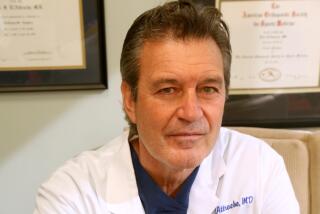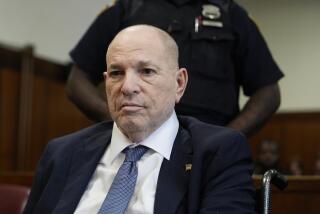Umpire Recovering From Five-Bypass Surgery
- Share via
Wally Bell was all set.
He had his plane ticket. He had his hotel reservation. He had his rental car booking.
And the National League umpire had something else waiting for him 2 1/2 weeks before he was supposed to leave for Arizona: a probable heart attack that could have killed him.
“The doctors said that if I had gone to spring training and worked in the heat, I might’ve checked out,” Bell said. “Dead.”
Baseball, however, was spared another tragedy three years after umpire John McSherry died of a heart attack on the field in Cincinnati on opening day.
Instead, the 34-year-old Bell is home in Boardman, Ohio, recovering from five-bypass heart surgery on Feb. 18.
“I know I got a reprieve, a second chance,” he said.
He’s even able to look ahead to his seventh year on the NL staff, encouraged by the support of his “hero”--wife Vickie, expecting their first child in August--and his family, friends and the whole circle of umpires, plus the efforts of all the doctors, nurses and rehabilitation personnel.
“I’ll come back to work when the doctors tell me I’m ready,” said Bell, who’s got an 8-inch scar down the middle of his chest. “I’m hoping to come back in May or June.”
Said NL president Len Coleman: “We’ll welcome Wally back with open arms.”
The entire episode began 11 weeks ago when Bell was in New York for the annual NL meetings. As part of that trip, he took a baseball-required physical and during his stress test was told he might have a problem.
A few days later, taking no chances, he visited The Heart Center back in Boardman.
“I wasn’t really concerned,” he said. “I was thinking, ‘I’m 34, it’s probably nothing.”’
But five minutes into the exam, cardiologist Dr. Steven Ballas told him there indeed was trouble. And the next day at Northside Hospital in Youngstown, Ohio, the prognosis became much more serious.
“They said, ‘We recommend you have surgery,”’ Bell said. “And then they said the magic word -- bypass. They said, ‘We may do three, we might do four.”’
That prompted Bell to ask one question: “Is this something I did to myself?”
Ballas told him mostly no, but partly yes.
The doctor said heredity was a major factor--Bell’s father had a couple of heart attacks before he died--although an umpire’s regimen of long travel days, tough games and late meals didn’t help.
“Clearly, genetics played a role, but that wasn’t 100 percent the cause,” Ballas said.
Bell said he was also overweight, although he declined to give specifics.
Two days later, surrounded by Vickie, family members, AL umpire John Hirschbeck and his wife, Denise, and several friends, Bell was being wheeled to the operating room.
After 3 1/4 hours of surgery by Dr. Timothy Hunter and several more hours asleep in the recovery room, Bell awoke early in the morning on Feb. 19.
“The next thing I know, I heard a voice -- my wife,” he said. “My arms were tied down so I wouldn’t pull out the ventilator.
“I asked her how it went,” he said. “She said, ‘You had five bypasses.”’
Two of his arteries had been 100 percent blocked. Two more had been 80 percent blocked, another 70 percent.
Not rare but certainly uncommon. Russian president Boris Yeltsin had quintuple bypass surgery in 1996.
That night, the calls and flowers and visitors started coming. Bell’s sister, Beckie, and brother, Chuck, and his in-laws were at his side. Brian O’Nora, who’s umpired AL games, stopped by. NL umpire Jerry Crawford phoned.
“I can’t begin to thank my second family--all the umpires--enough for what they did,” Bell said. “They’ve been there for both of us since the beginning.”
Only four days after surgery, he got a big surprise. Doctors told him he could go home.
The living room at the Bells’ house was rearranged, and a La-Z-Boy chair was brought in to make it more comfortable. Vickie slept on a nearby couch for a week to stay close to her husband. Two friends, Mike Shane and Rick Jones, came over every day to help Wally up the steps to the shower.
“The support I got all along, Vickie and I can’t begin to thank people enough. It was phenomenal,” Bell said. “And I’ll never be able to say how much Vickie did for me. I couldn’t have done it without her.”
Said Vickie: “It all happened so fast, and I knew I had to be strong for him. It helped that I was never alone, that people were around me.”
Within a day, he was walking five minutes around the house. Three weeks later, he was back at The Heart Center for rehab, guided by Jan McElroy and Jason Triveri.
By then, spring training had started. And though he saw highlights on TV and read newspapers, he did not pine for the game.
“We didn’t even discuss it,” he said. “I missed baseball, but it wasn’t a driving force. My priority was my health.”
On opening day, Bell was supposed to work at second base at Dodger Stadium when Arizona played Los Angeles. He watched a bit of that game--the Randy Johnson vs. Kevin Brown matchup was shown on ESPN--and saw Mark Wegner taking his place on a crew with Bruce Froemming, Mark Hirschbeck and Ed Rapuano.
“It wasn’t bad, seeing where I would have been. I still knew deep inside I couldn’t work,” Bell said. “Could I punch a guy out without hurting my shoulder? No.”
In the last month, Bell has continued to progress at a healthy pace. He has gone fishing and played golf, run drills with a local high school baseball team and worked out six days a week--three at The Heart Center and three at home.
And the calls from umpires kept coming. AL crew chief Joe Brinkman, in fact, phoned a few days ago on his way to a game in Kansas City.
“We’re doing well. I’ve lost weight. I’m eating a healthier diet,” Bell said. “Everything right now is falling into place.
“I’m a big guy, but I’ve always moved pretty well. I feel better than I ever have; I have more energy than I’ve had.”
And he’s getting ready to bring that force to the ballpark.
“On the field, Wally Bell has not changed,” he said. “I’m not going to go on the field meek and mild.”
Of course, there will be some changes off the field.
“My big meal will be in the middle of the day, not after games,” he said. “The clubhouse guys will know that I need a salad or tuna fish after games.”
And along with his scars from the past few months, he’ll carry thoughts about his future.
“He definitely lengthened his life expectancy in the foreseeable future,” Ballas said. “But he obviously runs the risk of having another problem. We didn’t cure his underlying problem--that can only be done when we find all the causes of heart disease.”
Bell will get that reminder at his annual heart checkup.
“Without question, the doctors tell you up front that 15, 18, 20 years from now, I could have another procedure,” he said. “Will I have one? A lot of that is up to me and the way I live.”
More to Read
Are you a true-blue fan?
Get our Dodgers Dugout newsletter for insights, news and much more.
You may occasionally receive promotional content from the Los Angeles Times.








